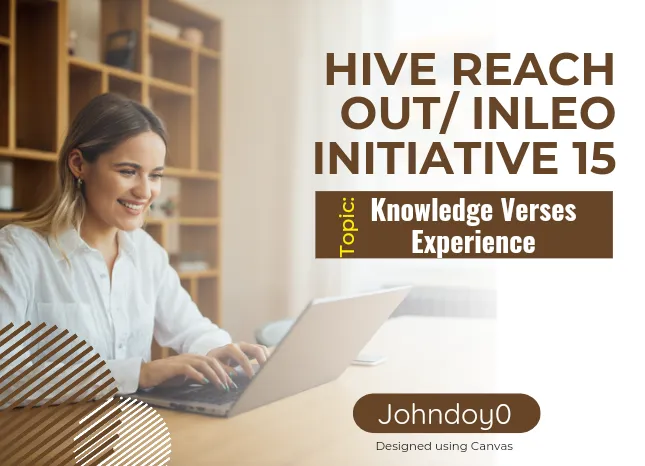Wow! The year is gradually coming to an end. This year won't end without you reaching the peck you have desired to reach.
Hive Reach out Community/Inleo initiative week 15, I am @johndoy0. It always amazing to find myself among great and wonderful persons. Alright, this week, we are considering a topic which says "Knowledge verses Experience"
They two have great impact in the formation of every human being. Cause by the time one of them is missing you become an incomplete personality. While because the knowledge you about a thing give an edge of million of billions who are illiterate over that thing, this is because with time you will tend to have an edge of them. It is written in the Bible " a man's gift maketh a room for him, for he shall stand not before ordinary men but before Kings. So what then is this knowledge?
Knowledge is a broad and multifaceted concept that refers to the awareness, understanding, and familiarity with information, facts, descriptions, or skills acquired through experience, education, or learning. It encompasses various aspects such as;
- Facts and information: Knowing specific details, dates, or data.
- Understanding: Comprehending concepts, relationships, and contexts.
- Wisdom: Applying knowledge to make informed decisions or judgments.
- Skill
Knowledge is divided into different types such as;
1.Declarative, Procedural, and Conditional Knowledge*
a. Declarative Knowledge (What): Facts, concepts, and information about the world.
Examples: Historical dates, scientific formulas, or geographical locations.
b. Procedural Knowledge (How): Steps to perform tasks or skills.
Examples: Riding a bike, cooking, or solving mathematical problems.
c. Conditional Knowledge (When and Why): Understanding contexts, conditions, and consequences.
Examples: Knowing when to apply a scientific principle or understanding the implications of a historical event. - Tacit Knowledge: Intuitive, experiential, and difficult to articulate.
Examples: Riding a bike, recognizing faces, or expertise gained through experience. - Formal and Informal Knowledge
a. Formal Knowledge: Structured, systematic, and acquired through formal education or training.
a. Informal Knowledge: Unstructured, experiential, and acquired through daily life.
Examples: Learning from family, friends, or personal experiences.
Additional Categories
Prior Knowledge:
a. Existing knowledge that serves as a foundation for new learning.
b. Core Knowledge: Fundamental concepts and principles in a discipline or domain.
c. Peripheral Knowledge: Secondary or supplementary information surrounding core knowledge
Experience can be defind as:
Oxford Dictionary: "Practical contact with or observation of facts or events, especially over a long period."
Merriam-Webster Dictionary: "Direct participation or observation; actual experience; knowledge or skill gained through involvement or exposure."
Cambridge Dictionary: "The process of doing or seeing things, which gives you knowledge or skill."
Encyclopedia Britannica: "The sum of all experiences, impressions, and knowledge gained by an individual through direct participation, observation, or involvement."
Practical knowledge or skill gained through direct participation or involvement in various activities, events, or situations over time.
Personal encounters, observations, or experiences that shape one's perspective, understanding, or character.
The process of learning, growing, or developing through exposure to diverse situations, challenges, or environments.
In essence, experience encompasses the accumulation of knowledge, wisdom, and expertise acquired through hands-on involvement and active engagement in various aspects of life.
Key aspects of Experience:
- Practical involvement
- Direct participation or observation
- Knowledge or skill gained
- Personal encounters or events
- Accumulation over time

Experience can be categorized into:
- Professional experience (work-related)
- Personal experience (life events, relationships)
- Social experience (interactions, cultural exposure)
- Educational experience (learning, training)
Knowledge and experience are related but distinct in some ways such as:
Knowledge:
- Theoretical understanding or information gained through study, education, or instruction.
- Familiarity with facts, principles, or concepts.
- Acquisition of information through reading, learning, or instruction.
Experience:
- Practical application or implementation of knowledge in real-world situations.
- Direct participation, observation, or involvement in events or activities.
- Skill or expertise developed through repeated exposure or hands-on involvement.
Key differences:
- Theory vs. Practice: Knowledge focuses on theoretical understanding, while experience emphasizes practical application.
- Acquisition: Knowledge is often acquired through learning, while experience is gained through direct involvement.
- Context: Knowledge provides general understanding, whereas experience provides specific, contextual insight.
- Depth: Knowledge can be superficial, whereas experience adds depth and nuance to understanding.
- Transferability: Knowledge can be transferred through instruction, whereas experience is often non-transferable.
Illustration:
- Knowledge: Understanding the principles of driving (e.g., traffic laws, vehicle mechanics).
- Experience: Actually driving a vehicle, navigating various road conditions, and adapting to unexpected situations.
Relationship Between Knowledge and Experience
Knowledge provides the foundation for experience, and experience refines and deepens knowledge.